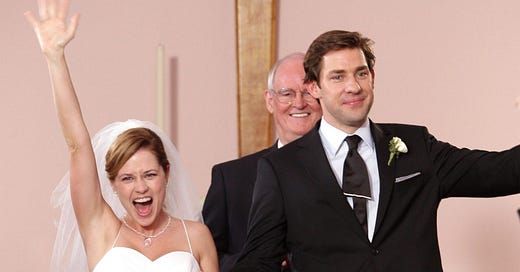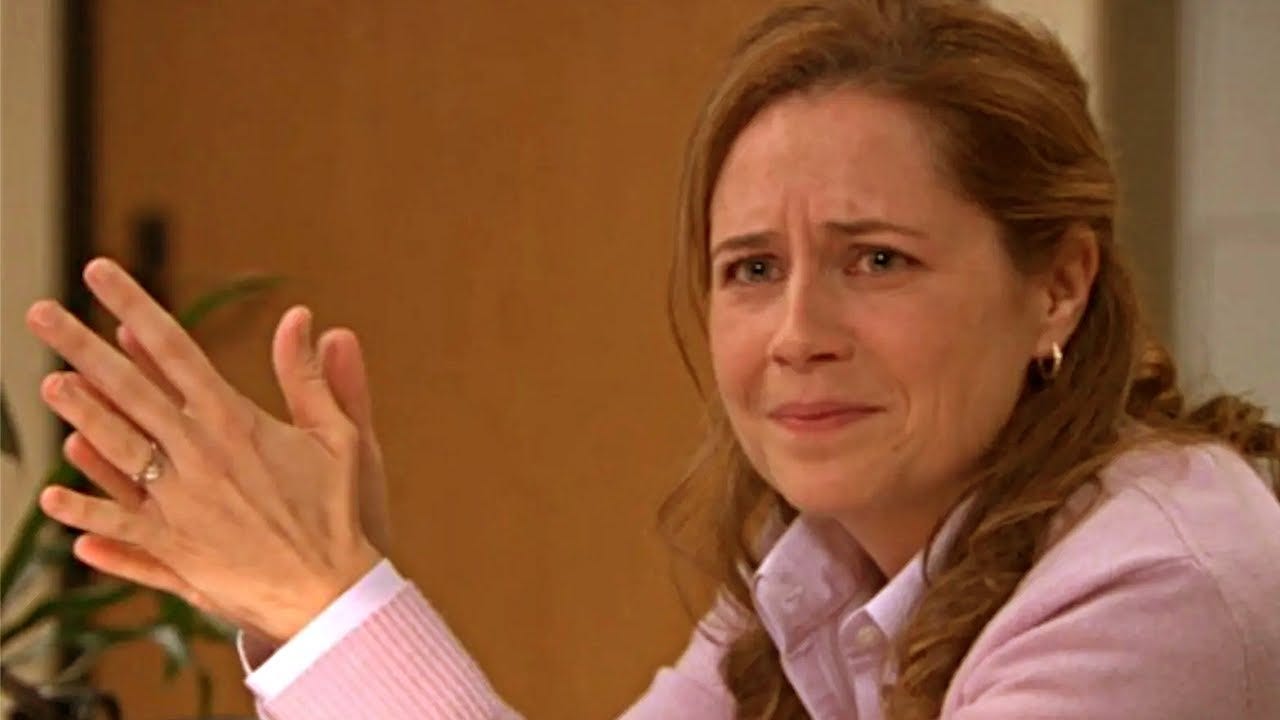(NB Spoilers for The Office)
More than a decade after everyone else, I have been catching up with the US version of The Office, which originally aired from 2005 to 2013 and tells the story of a branch of the fictional paper company Dunder Mifflin. While primarily a comedy, it does feature some bona fide drama, and there is a fascinating and very well-crafted storyline in the ninth and final season involving the show’s golden couple Jim and Pam Halpert.
The storyline made me think of a Substack post by Mary Harrington (@moveincircles) from summer 2023, in which she invited people to share “marriage survival stories”.
Mary’s reasoning was that we hear a lot about why divorces happen, but not so much about how people overcome serious trials to keep their marriages intact (because people don’t, by and large, want to talk about the subject in public), and that it was important for there to be “cultural scripts” for how to do this. Intentionally or not, the scriptwriters for The Office have provided a decent template for understanding how a basically solid marriage between two well-meaning and compatible people can run into severe difficulties, and how those difficulties can be acknowledged, managed and conquered.
In its first three seasons, the romantic tension between the laid-back, charming salesman Jim and the artistic, self-effacing receptionist Pam is the main dramatic engine of the show. Pam has a long-term engagement to the complacent boor Roy, but develops a close friendship with Jim, which flowers into something else. Jim and Pam finally become a couple at the beginning of the fourth season, and marry in the sixth. For a long time in the middle years of the show they just chug along very happily. They have two children but that doesn’t really disrupt their possibly-somewhat-idealised life.
Particularly after their wedding you get the sense that the writers were marking time with the pair. In the very funny season eight episode ‘Pam’s Replacement’, a heavily pregnant Pam worries about Jim finding her maternity cover Cathy attractive. Later, in ‘After Hours’, Cathy does actually make a concerted effort to seduce Jim on a work trip to Florida, but both plots are played for laughs. The show never gives you any reason to expect that Jim - the man who loved Pam from afar for several years and bought an engagement ring one week after their first date - could waver in his loyalty to her (sure enough, he doesn’t, and you can watch a funny deleted scene from ‘After Hours’ that tells the viewer a lot about their rock-solid bond of trust).
However, in the ninth and final season the writers finally find something dramatically interesting to do with Mr and Mrs H. We learn in the first episode (‘New Guys’) that Jim has turned down a chance to get involved with a friend’s start-up “Athlead”, based on an idea that Jim had in college. We get the distinct impression from the Halperts’ talking head interview1 that Pam very firmly put the kybosh on the idea, because the firm is based in Philadelphia (125 miles from Scranton, where the series is set) and she does not want to uproot their family.
But at the very end of the episode Jim calls his friend and takes the job offer after all. This is the catalyst for serious marital tensions over much of the ensuing season. Initially these arise from Jim’s disregarding their joint decision not to get involved, and not telling Pam. He doesn’t keep it secret for long, but as Pam is adjusting to the new reality, Jim – under pressure from his fellow founders – unilaterally invests more money in Athlead than Pam had agreed, and soon starts spending half of each week in Philadelphia, leaving Pam back in Scranton to look after the children while still working full-time (Pam agrees to this arrangement, but not without reluctance). Eventually the two have a big row – their first on-screen, and a painfully realistic one which will make many couples wince with recognition, as it escalates from minor skirmishing about a particular incident to a more general battle over bigger issues. This forces them to confront their problems. An added source of tension is Pam’s receiving emotional support from another man, “Brian the boom mic guy”, during her troubles with Jim.
In the later episodes of the season, things get better. All the same, the arc is hard for us to watch as the audience, after so many years first rooting for them to get together and then being charmed by their romance and their family life. But it’s also well-written and convincing, because it feels very true to life for a couple at their stage of marriage. Neither Halpert needs to have a character transplant for the drama to work. Infidelity, that reliable fallback for the lazy dramatist, is not on the cards. Instead, the tension arises organically from already well-established traits.
Jim hasn’t become a bad husband or a bad father. He has not acquired a mistress or an addiction, or started cooking meth. He’s a decent guy, with potential, who for various reasons has got bogged down in a comfortable but also fairly boring and possibly doomed2 job. Having coasted for years, he realises that time is slipping by, a realisation jogged along by Pam’s offhand comment about nothing changing, and by attending the wedding of Pam’s old fiance; once an oafish warehouseman at Dunder Mifflin, Roy has become a successful small business owner and (seemingly) a much improved person. So when Athlead comes calling, Jim suddenly sees his big chance not only to do something other than sell paper, but to follow an actual dream. His strong aversion to open conflict - an important characteristic throughout the show - feeds into his communication problems with Pam.
Similarly, Pam is not being unreasonable. After being quietly dissatisfied for years with Roy, she has found the man she regards as her soulmate. She has her children and her steady job and her nice house in the suburbs. “I love my boring life exactly the way it is”, she tells colleague Dwight in ‘New Guys’. In a conversation with the camera crew in the same episode, she notes that while there was a lot of drama around her and Jim in the early days, “nothing interesting is going to happen to us for a long, long time”, and seems entirely reconciled to the fact. One of the reasons for her discomfort with Jim’s new venture is that she fears he is outgrowing her, and transcending the relatively circumscribed world of the Dunder Mifflin Paper Company and Scranton, where she feels happy and secure, and where her and Jim formed such a strong bond.
Both could plausibly be criticised. Jim, as noted above, tends to be a poor communicator and has taken some big steps without asking Pam first. He seems not to have opened up to his wife about how frustrated he feels at Dunder Mifflin, and rather takes her support for granted, without appreciating what is involved. Pam, on the other hand, is arguably over-cautious and too risk-averse, and hasn’t been straightforward with Jim regarding her feelings about his past unilateral decision-making.
But fundamentally this is a situation where neither of them is doing anything awful or unjustifiable. It’s a serious, good faith clash of preferences exacerbated by communication barriers and the pressures of raising children, which is to say it’s the kind of disagreement that most long-term couples face at some point. It’s a genuinely difficult impasse.
And, importantly, the couple make it through. They go to counselling, which makes them more honest with each other. After being confronted with the reality that his work at Athlead is a serious threat to his marriage, Jim gives up his role at the company, choosing to go “all in”3 on his family and even turning down the chance to go on a nationwide promotional tour when the company becomes a big success. Subsequently, Pam - reassured by Jim’s demonstration that she and the children are his first priority, and remembering Jim’s devotion to her over the years - secretly puts their Scranton house on the market so that Jim can move to resume his work for the now booming Athlead in Austin, Texas.
Yes, it’s a bit neat and Hollywood, with Pam’s secret sale of their house mirroring Jim’s secret acquisition of it (which was one of the unilateral decisions made by him that she came to resent). But at the core of it is something quite important and inspiring: two people learning to be more open with each other about their feelings and needs, and making sacrifices for each other. When he first decides to quit Athlead, and when he turns down the offer to go on tour, Jim has no way of knowing whether that particular door will ever open again. He really is putting aside - for good, as far as he knows - a passion project and a huge personal opportunity, for the sake of Pam and the children. Similarly, Pam’s decision to initiate the move to Texas represents a big step for her, away from family and friends and the well-known (Austin is 1700 miles away from Scranton). But she does it anyway.
It is striking that, in a particular pivotal scene at the end of the episode ‘Paper Airplane’, when Pam initially struggles to return Jim’s embrace before kissing him passionately - a moment which appears to be the catalyst for Jim’s giving up Athlead - the action is intercut with Jim’s brother reading from 1 Corinthians 13 on their wedding day. “Love is patient and kind; love does not envy or boast…Love bears all things, believes all things, hopes all things, endures all things…So now faith, hope, and love abide, these three; but the greatest of these is love.”
This particular text is a wedding day cliche for a reason. It’s fine poetry, yes, but also it correctly describes love not so much as a mere feeling but as a set of concrete actions and attitudes, which we must cultivate carefully. And abiding by that understanding of love is what gets Jim and Pam out of their bad patch and forward into the rest of their lives.
The Office is set up as a “mockumentary”, with the characters regularly giving their thoughts direct to camera.
The ongoing difficulties of the paper industry in the age of the internet revolution are a recurring theme of The Office.
The motif of going “all in” on some course of action has cropped up before in the show. It appears in the second season finale ‘Casino Night’, when Jim first declares his love to Pam after the two flirt over a game of poker. It is also the phrase that Jim uses in ‘New Guys’ when he decides to join Athlead, so there is a pleasing symmetry to his using the same words to reaffirm that wife and children are his number one priority.






Good stuff. Being married makes you realise how much of tv is made by/ for /about young single people and how rarely you get to see even simplistic takes on long term married life. Just on the US office generally it’s funny to me, given their respective reputations, how much better it is than the UK version although obviously they became very different programmes. I think it’s a residual hangover of the long vanished time when British tv was considered the best around
Brilliant! After your analysis I'm seriously considering watching the entire run of The Office.